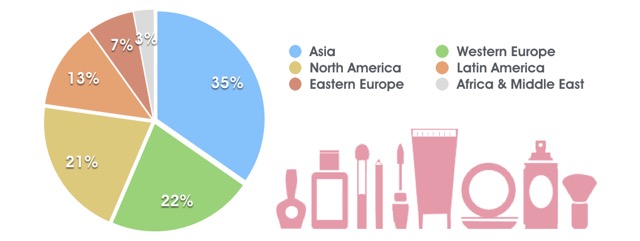One of the major opportunities for neem discussed at the Global Neem Trade Fair 2016 is derived from the various applications the tree has in personal health and its impressive potential as a lucrative entry point for the global organic personal care market.
The global personal care and cosmetic market was valued at $196 billion in 2015. While growth remained subdued in this sector at 3.8% over the last decade, the organic segment of the market (valued at $1.8 billion) is expected to reach $16 billion by 2020 at a CAGR of 9.8%.
Global Personal Care and Cosmetic Market Share 2015

Neem has a substantive, high-end contribution to make in a variety of personal care and health areas, specifically in protecting and rejuvenating the skin.
Skin ageing depends on a variety of factors, including lifestyle, diet and genetics, though one factor remains consistent – the impact of drier and less elastic skin on our appearance. Neem contains 4x the level of antioxidants that are found in cranberries, blueberries and artichokes, thoroughly limiting the production of skin-damaging free radicals. The high Vitamin E, fatty acid and emollient content of its oil improves elasticity, reduces wrinkles while moisturizing the skin. Known for removing impurities and tightening pores, neem-based skin care products are now offered by cosmetic brands such as L’Oreal, Garnier, Avon, Shiseido and Dr. Hauschka.

The neem tree is also effective in treating a variety of skin conditions. Acne, one of the most common skin diseases in the world, affects 80% of people between 11 to 30 years old. Although there is currently no cure for the condition, quercetin (a compound found in neem oil) has been found to relieve its symptoms by reducing the level of bacteria in the skin while soothing redness and inflammation. A major benefit of using neem to treat acne is that its non-toxicity ensures there are no unwanted side effects, a consequence of many chemical alternatives. Roche’s Accutane, a once popular ‘miracle cure’ for acne, was withdrawn from sale in the US as it was associated with causing birth defects, miscarriages and mental health issues
Eczema, another skin condition that affects 1 in 10 people in the world today and characterized by rashes appearing all over the body, can also be treated by neem. The oil, with its antiseptic properties and high Vitamin E content, restore the skin’s protective barrier and effectively soothes the condition’s symptoms.
Some of the latest research into neem skin care has found that the oil can serve as a natural remedy for minor burns by reducing pain, facilitating healing by promoting cell formation and minimizing scar development. Neem oil was found to ease the burning sensation in the affected areas because of its antihistamine activity, while protecting any newly formed skin due to it’s high vitamin E content. The high concentrations of omega-6 and omega-9 fatty acids in neem oil also promote new skin cell formation. Finally, neem oil keeps burn wounds free from skin infections as neem inhibits bacterial and fungal growth.
Neem has proven its potential to aid mankind both in providing sustainable and safe agricultural practices as well as potential in the treatment of many diseases ranging from HIV to Cancer. The phenomenal ability of this truly astonishing tree does not stop there, with major players in the personal care industry utilizing neem in their organic product lines.